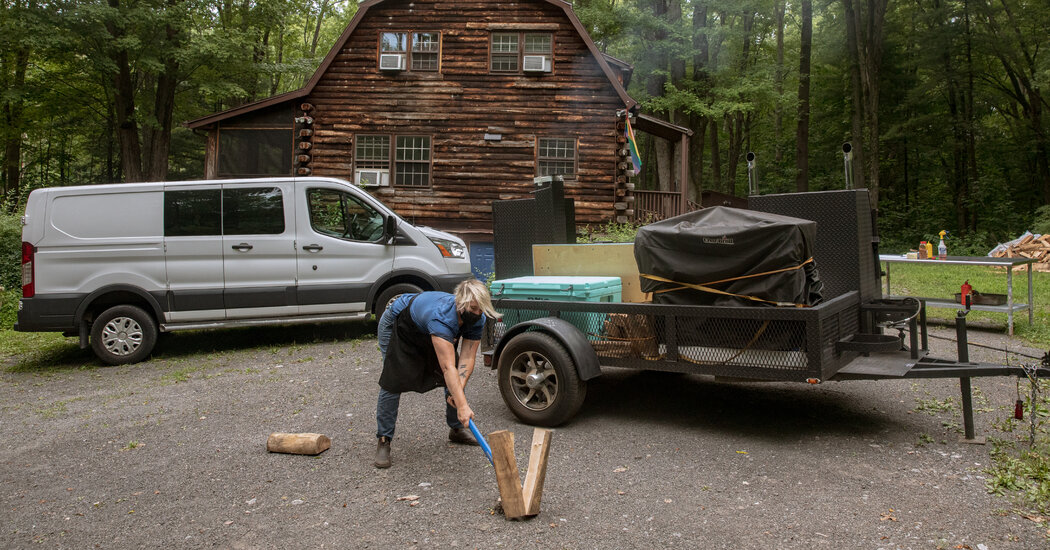MARKETING NEWS
‘Closing Isn’t Even an Option’: With No Events, Caterers Rush to Adjust
On a recent Saturday, petite lobster rolls on toasted brioche and coconut shrimp with mango aioli were to be passed among the guests at a 210-person wedding. A bar mitzvah party for 180 was going to conclude with torched s’mores and a chocolate fountain.For David Cingari of David’s Soundview Catering in Stamford, Conn., the events, along with food for an anniversary party, should have brought in roughly $6,600 in profits.Instead, he was dashing about, serving lobster rolls, blackened mahi-mahi tacos and smashburgers alongside cocktails like the Painkiller to socially distanced diners at a pop-up restaurant he opened in mid-June.His take? About $600.The restaurant, David’s at the Landing, is the third iteration of Mr. Cingari’s catering business since the coronavirus pandemic struck, bringing his $7 million-a-year company to a sudden stop.“We were going to do $300,000 in graduation parties this spring,” he said. “That’s just gone.”The pandemic has the nation’s caterers — roughly 12,000 individuals or companies with annual revenues of more than $60 billion — reeling. Many caterers say they expect their business to be down between 80 and 90 percent this year. Corporate cafeterias that they provide food and staff to remain closed. Events like graduation and anniversary parties, bar mitzvahs, charity dinners and weddings have been canceled or pushed into next year.And the ones that took place were on a decidedly smaller scale.“We did one 50-person wedding,” Mr. Cingari said. “It was a clambake in the backyard. That was supposed to be a 250-person wedding.”The collapse of the catering industry this year directly affects bartenders, wait staff and others who typically work these events as part-time employees.The industry — a collection of large corporations like Aramark and Compass Group and thousands of smaller companies owned by individuals — is not tracking how many caterers have permanently closed because of the pandemic, but they say it will happen.“If I look locally at South Jersey, I know of a few caterers and some venues that are severely struggling,” said Doug Quattrini, the president of the National Association for Catering and Events and an event producer at Sensational Host in Maple Shade, N.J.While caterers say they are taking a financial beating, many feel better situated than those in the restaurant business. (Not surprisingly, many caterers worked in restaurants before switching jobs.) Instead of paying often expensive rent in desirable locations like most restaurants, caterers typically pay less for large kitchens that can be off the beaten track.Moreover, caterers tend to be a nimble group of entrepreneurs, adept at providing finicky couples with their every heart’s whim and overcoming the oddest of logistical challenges. Those traits have helped them during the pandemic.“We have huge logistical expertise,” said Peter Callahan of Peter Callahan Catering, whose clients include some of New York’s wealthiest financiers and whose specialty is mini food like one-bite cheeseburgers and tiny grilled cheese sandwiches. “When you’re an off-premise caterer, you might be doing an event that requires barges to get to a private island with no vehicles.“We’re creative thinkers, and right now people are thinking about how to shape their businesses for the need at hand,” he added.As the traditional bar-mitzvah-and-wedding circuit collapsed, caterers began to think about different ways to make money.“It’s the year of the pivot,” said Holly Sheppard, who spent years working as a line cook at New York City restaurants before starting her Brooklyn catering business, Fig & Pig, in 2011.Ms. Sheppard was in the middle of preparing a meal for 600 people in mid-March when the client called, canceling the event. The food, which had already been paid for, was donated.After that, Ms. Sheppard said, the cancellations and postponements rolled in. Of the 47 weddings she had scheduled for this year, 40 have been pushed into next year. The others were canceled outright.With her calendar now largely empty through the fall, Ms. Sheppard gave up the lease on her apartment in Brooklyn, worked out a deal with the landlord for her kitchen to pay what she can now and make it up next year, and moved to her house in Tillson, N.Y.There, she bought a smoker and is honing her skills, planning to add barbecue to her catering options.“I’m going to be a female pitmaster on the roadside in upstate New York until the weddings come back,” Ms. Sheppard said. “I’m going to make it through all of this. Closing isn’t even an option. I’m a scrapper.”Mr. Cingari has been hustling in the food industry for four decades and has no intention of letting the coronavirus end his business.After working as a hotel chef at the Grand Hyatt in New York, Mr. Cingari opened a restaurant, David’s American Food and Drink, in Stamford in 1987.But after a decade of long hours, constant staff turnover and long nights worrying about paying his $13,000-a-month lease, Mr. Cingari, whose family owns ShopRite grocery stores in the area, decided to close the restaurant in 1997 and focus solely on his catering operation.The business took off, and by the end of the year, David’s Soundview Catering had 85 employees preparing food out of a 6,000-square-foot commissary kitchen.About 80 percent of the business came from delivering breakfast and lunches for corporate meetings and from preparing food for and staffing more than a dozen corporate cafeterias in the area. On weekends, Mr. Cingari’s calendar was filled with weddings, anniversary parties and bar mitzvahs.The first inkling Mr. Cingari received that this year was going to be anything but normal came in late February when he was notified that the employees of a Japanese-based company in one of the buildings where he managed the cafeteria would be working from home as part of an emergency response trial. A week later, a large international bank said it would be doing the same thing.“It was like wildfire,” he said. “Within three weeks, every one of the cafeterias were closed and any event we had on the books was canceled.”Mr. Cingari said he had received money from the federal Paycheck Protection Program to cover around 80 of his employees.As companies shut down and people began staying at home in mid-March, Mr. Cingari shifted his business. He had noticed how people were raising money on social media to provide meals to hospitals and emergency medical workers, so he did the same. The money donated through the social media outreach paid for the cost of food and supplies.“Since we had this large commissary kitchen, we could do huge numbers of meals,” he said, though he made no profit from it. “So we started making a few thousand meals a day for several weeks to feed hospital workers and others.”That effort began to dry up as coronavirus cases declined in Connecticut in the late spring.So Mr. Cingari shifted again, this time providing groceries, hard-to-find household items like toilet paper and Clorox disinfecting wipes, and take-home meals for $50 that could feed a family of four. In early June he would sell close to 60 meals on a Saturday night, he said.“It didn’t even come close to what we were making before,” he said, “but it was something.”But that business petered out when the state allowed outdoor dining. On the final weekend of that iteration of his business, Mr. Cingari sold five take-home meals.So in early July, he shifted again. Through one of the buildings in a corporate office park where he manages the cafeteria, he had access to an indoor dining area and outdoor patio space overlooking the harbor in Stamford. He had used the space in the past for weekend events like birthday parties and bar mitzvahs.Now, on that outdoor patio, Mr. Cingari has started a pop-up restaurant, David’s at the Landing. The restaurant is open Thursday through Saturday nights and serves a limited menu of appetizers, five entrees, cocktails, wines and beers. On a recent Saturday evening, the wait time for a table at the restaurant, which seats 65 with social distancing, was nearly two hours, he said.“I can’t believe I’m back in the restaurant business,” Mr. Cingari said. “Shoot me. Still, the business is covering costs and making a little bit of money for the eight people who are working there.”This latest incarnation will also be short-lived, likely to close in mid-September as the weather in Connecticut turns cooler.Mr. Cingari had hoped the corporate cafeteria side of his business would come back at least a little bit by the fall. But with coronavirus cases spiking in different parts of the country, he now has his doubts about that.“It’s all I think about all day and all night,” he said. “I just hope that another pivot comes to mind by mid-September that will hold us until January. There has to be some way. I have too many good people and too much wisdom under my belt to not be able to figure this out.”
Source link













